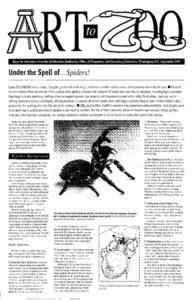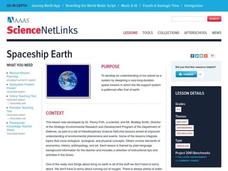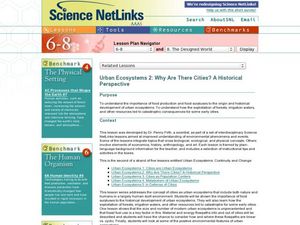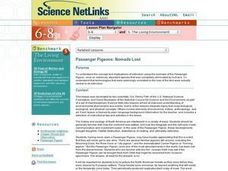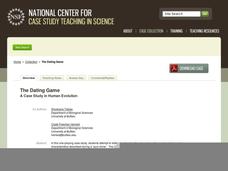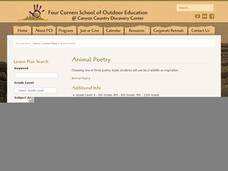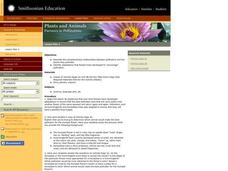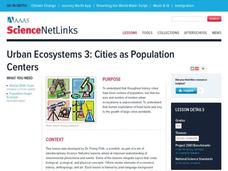Curated OER
Anthropology Exam 1
In this word search worksheet, students locate 20 vocabulary words related to physical anthropology. The word list includes allele, amino acids, and taxonomy.
Curated OER
Human Evolution: Biology, Bones
Learners will love a weeks worth of bone study. They use bones and characteristics of bones to explore the evolution of hominoids. Bones are compared, categorized, and considered. A great way to bring physical anthropology and material...
CK-12 Foundation
Radiocarbon Dating
How do we know how long ago a dinosaur lived or an ancient fire pit was used? Scholars learn about the application of carbon dating and half lives to discover things about the past. They adjust the amount of radioactive carbon in the...
Curated OER
How Things Fly
Students, by drawing on their own experiences, discuss and examine the basic physics of flight. They participate in a variety of activities regarding flight.
Curated OER
Under the Spell of Spiders
Learners examine spiders. In these spider lessons, students will view spider images and live spiders to determine physical characteristics, habits, and habitats. Learners will examine fantasy and folklore about spiders to create and...
American Museum of Natural History
Make Your Own Einstein Stationary
No need to be an Einstein for this project! Clever crafters add their name, address, and country to three Einstein-themed templates and create their own, personalized stationary. A great way to stay connected while social distancing.
American Museum of Natural History
Einstein in Time
Einstein sure had an interesting life. Using a remote learning resource, pupils examine a timeline of Einstein's life. They learn about the major scientific discoveries as well as humanitarian and social work. Additionally, they read...
Howard Hughes Medical Institute
Got Lactase? The Co-Evolution of Genes and Culture
Does the human body evolve as quickly as human culture? With a stellar 15-minute video, explore the trait of lactose intolerance. Only about 1/3 of human adults seem to still have the enzyme lactase and therefore, the ability to digest...
Manitoba Education and Early Childhood Learning
Forensic Sciences: A Crime Scene Investigation Unit
Mr. Bergman has been murdered and we need you to solve the crime! The cross-curricular unit covers 11 different types of forensic science and includes 17 activities. Scholars perform blood type analysis, blood spatter analysis, height...
Curated OER
Spaceship Earth
Students develop an understanding of our planet as a system by designing a very-long-duration space mission in which the life-support system is patterned after that of earth.
Curated OER
Urban Ecosystems 4: Metabolism of Urban Ecosystems
Students discover that material and energy uses by a city come from outside the city boundaries. They realize that the pathway of these material is linear instead of cyclical as they are in natural ecosystems.
Curated OER
Urban Ecosystems 2: Why Are There Cities? A Historical Perspective
Students investigate the importance of food surpluses to the historical development of urban ecosystems.
Curated OER
PASSENGER PIGEONS: NOMADS LOST
Students explore the concept and implications of extinction using the example of the Passenger Pigeon, once an extremely abundant species that was completely eliminated by humans.
National Center for Case Study Teaching in Science
The Dating Game
Learn about the human's ancestors through the (carbon) Dating Game. Use the script to have your high schoolers act out one round of the game. Once they have the idea, they will research another human ancestor and play a second round the...
Curated OER
Stopping Deforestation in the Amazon: A Publicity Campaign
Students investigate the environment by designing a group project. In this ecology lesson, students identify the man made threats to the Amazon while reading environmentally conscience vocabulary terms. Students collaborate in groups...
Curated OER
Ecosystem Services - Water Purification
Students see that ecosystems provide services to people that are essential to life as we know it. Reporters (drops of water) could interview the trees and soil in the surrounding ecosystems for news stories on how they helped keep the...
Curated OER
Water Purification
Students use the example of natural water purification to show that healthy ecosystems provide services to people that are essential to life as we know it.
Curated OER
Animal Poetry
Fourth graders write poems that use local wildlife as their inspiration. After a class discussion which produces a list of wildlife that pupils have seen in their town, a review of three types of poetry ensues. They look at how haiku,...
Smithsonian Institution
Watching Crystals Grow
Amazing science can sometimes happen right before your eyes! The class gets cozy as they watch crystals grow. They use Epsom salts, rocks, and food coloring to create crystals. They'll observe the entire process, documenting every step...
Curated OER
Great Rivers 2: The Ups and Downs of River Flooding
Second in a three-part lesson on rivers, this lesson focuses on the flooding that occurs in riparian locations. First, learners take a look at facts about the Amazon River. They read online materials and fill in a worksheet as they...
Curated OER
Urban Ecosystems 2: Why are There Cities? A Historical Perspective
Second in a series of five lessons, this lesson encourages preteens to consider cities as urban ecosystems. First, they keep a food diary for a few days. They visit the Natrional Agricultural Statistics Service website for current data...
Curated OER
Urban Ecosystems 4: Metabolism of Urban Ecosystems
Cities are compared to living, breathing, metabolizing organisms. Fourth in a five-part series of lessons, this one focuses on the flow of materials through a city. Links to interesting websites and images make your delivery of...
Curated OER
Plants and Animals: Partners in Pollination
Students describe the complementary relationships between pollinators and the plants they pollinate, identify adaptations that flowers have developed to "encourage" pollination, and create and draw their own "designer" flowers.
Curated OER
Urban Ecosystems 3: Cities as Population Centers
Young scholars discover that throughout history cities have been centers of population but that human exploitation of fossil fuels was key to the growth of large cities worldwide. They research urban growth through a number of websites.






